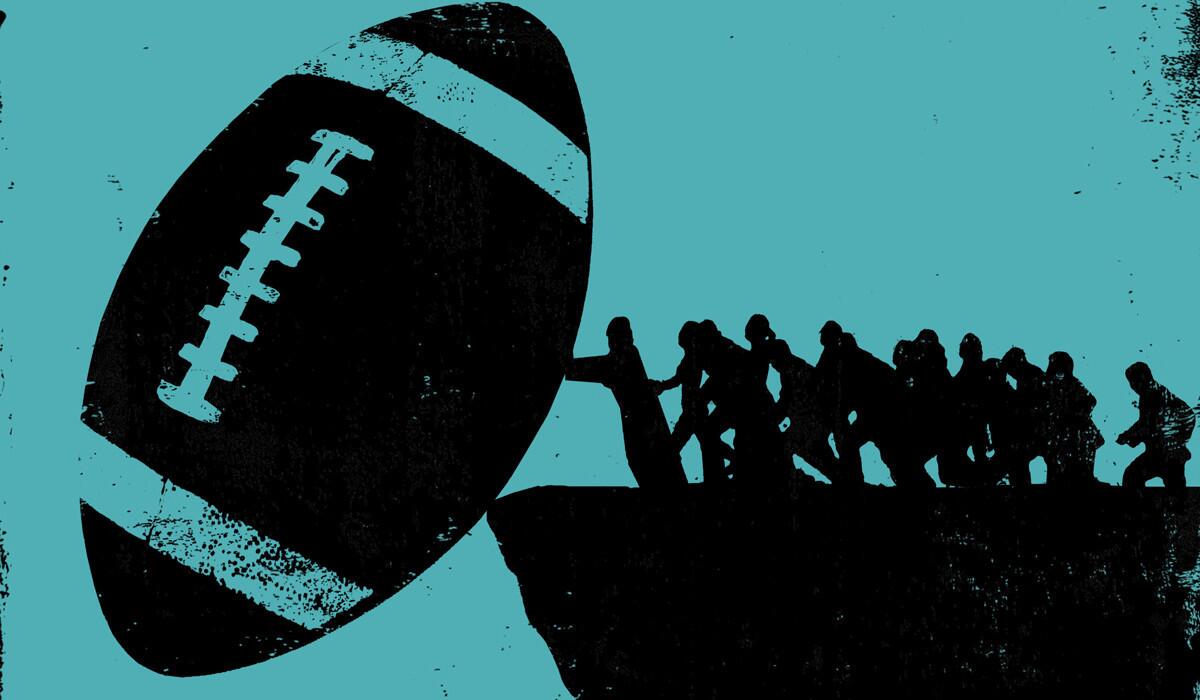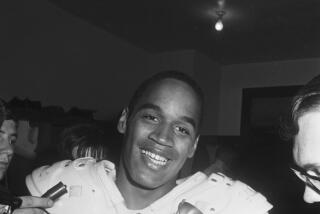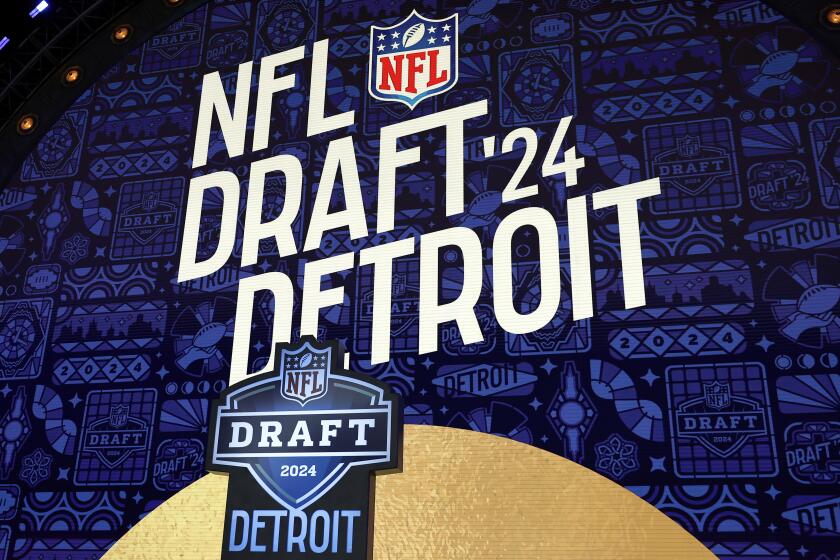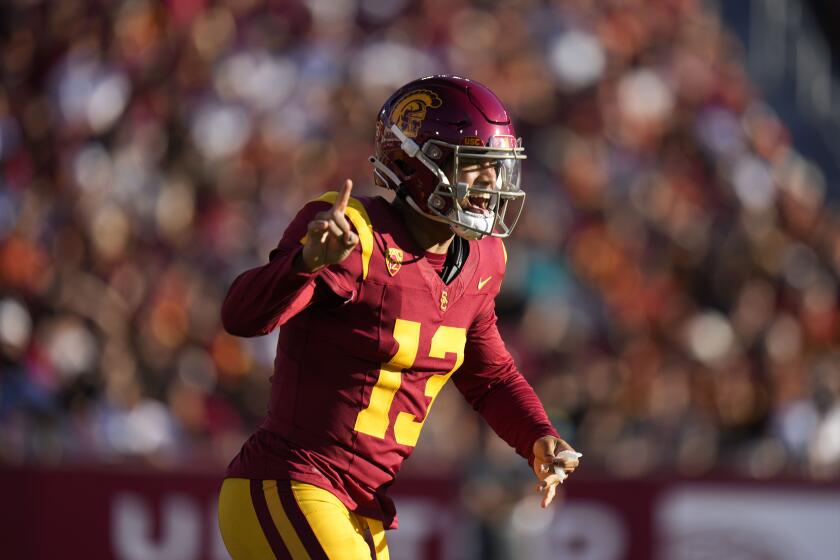Column: Football, as a cultural force, is off its game

Two years ago, I began to suspect football was losing its grip on America. My son had just joined his high school team and many of my friends acted as if I were launching him on a solo attempt to circumnavigate the globe. In a canoe. “You’re letting him do what?”
I’ve never been a huge fan of football. It seemed to epitomize everything I loathed about jock culture — physicality that borders on menace, an outsized sense of entitlement — and, more important, I found it boring to watch.
But if my son wanted to play football, I would cheer him on just as I had when he played baseball and soccer and basketball.
I certainly didn’t expect such a wide variety of people to look at me like I had just handed my kid a cigarette or agreed to let him drop out of school to pursue an acting career. (Especially those people who took their kids on rock-climbing trips and ski vacations, or let them drop out of school to pursue acting careers.)
Now I see that we were just experiencing the first tremors of a social upheaval. Football, that great American institution and multibillion-dollar industry, is rapidly losing its cultural currency.
The game that once produced a thousand heroic images and breathlessly relayed statistics is now just as often documented in terms of brain damage, suicide rates and death. A lawsuit charging that the NFL covered up the possibility of long-term brain damage may wind up costing the league close to $1 billion in settlements. A recent Time magazine cover featured Chad Stover, a 16-year-old high school player who died from head injuries, with the question “Is Football Worth It?”
The narratives of team dedication and personal sacrifice that gave us “Brian’s Song,” “Rudy,” and “We Are Marshall” have been eclipsed by revelations of ongoing pedophilia (Penn State), hazing (the Miami Dolphins), charges of child abuse (Minnesota Vikings’ Adrian Peterson) and the horror of watching Ray Rice knock his fiancée unconscious on an elevator and NFL Commissioner Roger Goodell trying to explain why it took him so long to realize that this was a big deal.
The NFL is so beset by abuse-related scandal that it recently created an all-female “social responsibility” team. (The only other all-female teams associated with the NFL are its woefully underpaid cheerleading squads, five of which have sued for fair wages.)
Meanwhile, instead of “Friday Night Lights,” we watch fallout from various scandals on television — ESPN’s Bill Simmons was recently suspended for calling Goodell an expletive-modified liar — and countless documentaries dedicated to the dangers of the game, including Frontline’s Concussion Watch series.
A Concussion Watch series.
Even the book industry senses a change, with two recent titles capturing the crossroads in language so obvious it’s almost laughable. The publication of “Why Football Matters: My Education in the Game,” by Mark Edmundson was quickly followed by Steve Almond’s “Against Football: One Fan’s Reluctant Manifesto.”
So how surprising was it, really, that this year’s World Cup had record-breaking television audiences? Clearly, some of us are shopping for a new sport.
Obviously, the Premier League is not going to replace the NFL anytime soon; even in crisis, football is a huge, healthy and vital part of the American culture and its economy. Super Bowl Sunday draws millions more real-time viewers than any other television event; NFL packages fuel the economy of television and cable carriers. Stadiums at every level remain full of fans.
Few empires fall all at once. But if 2014 is not the year that football died, it may be the year it sustained injuries from which it could not survive either long-term or unchanged.
The NFL can become as socially responsible as the Red Cross, but as our family discovered, the mythology of the game is changing at a grass-roots level. While some fans complain that too many flags and too much concern for injury and personal behavior are ruining the rough-and-tumble game they love, an increasing number of adults see football as a poor parenting choice.
And that is a much bigger problem than any scandal: Tackle football among 6- to-12-year-olds has declined by nearly 27% in the past seven years.
Like any system that becomes larger than its participants, sports requires mythology to survive, and the mythology of football is changing. I’ve seen it in my own house. My husband, Richard, was a star middle linebacker for the Lakewood High Lancers, but during his senior year he read the Beats and decided organized sport was just another form of social authoritarianism.
He told his coach he would not be playing college ball; his coach never spoke to him again. Richard doesn’t regret his decision but he is still a huge football fan and the memory of four years on the gridiron remains as clear as the ones that would follow in the Haight. He rhapsodizes the rigors of the training — if you didn’t get the dry heaves, you weren’t trying — and the toughness it instills — his little finger was once all but pulled off, but still he kept playing.
He signed Danny up for the local youth tackle program when he was 9, and was thrilled when he joined the freshman team.
Then, slowly, he became concerned.
He watched all the documentaries about heat stroke and concussions, read the studies on long-term brain damage. “One and you’re done” was our rule regarding concussions.
We never had to put it to the test. A genetic condition began to curve Danny’s spine. After the surgery, the doctor said he could return to any activity except bungee jumping and tackle football.
Having watched injured athletes and their parents downplay doctors’ recommendations on playing fields of all sorts, I steeled myself for the arguments I feared from son and father.
They never came. Danny and his dad love football, but not to the point of unreasonableness, not to the point of insanity.
Which seems to be exactly how many Americans are feeling right now.
More to Read
Get our high school sports newsletter
Prep Rally is devoted to the SoCal high school sports experience, bringing you scores, stories and a behind-the-scenes look at what makes prep sports so popular.
You may occasionally receive promotional content from the Los Angeles Times.







